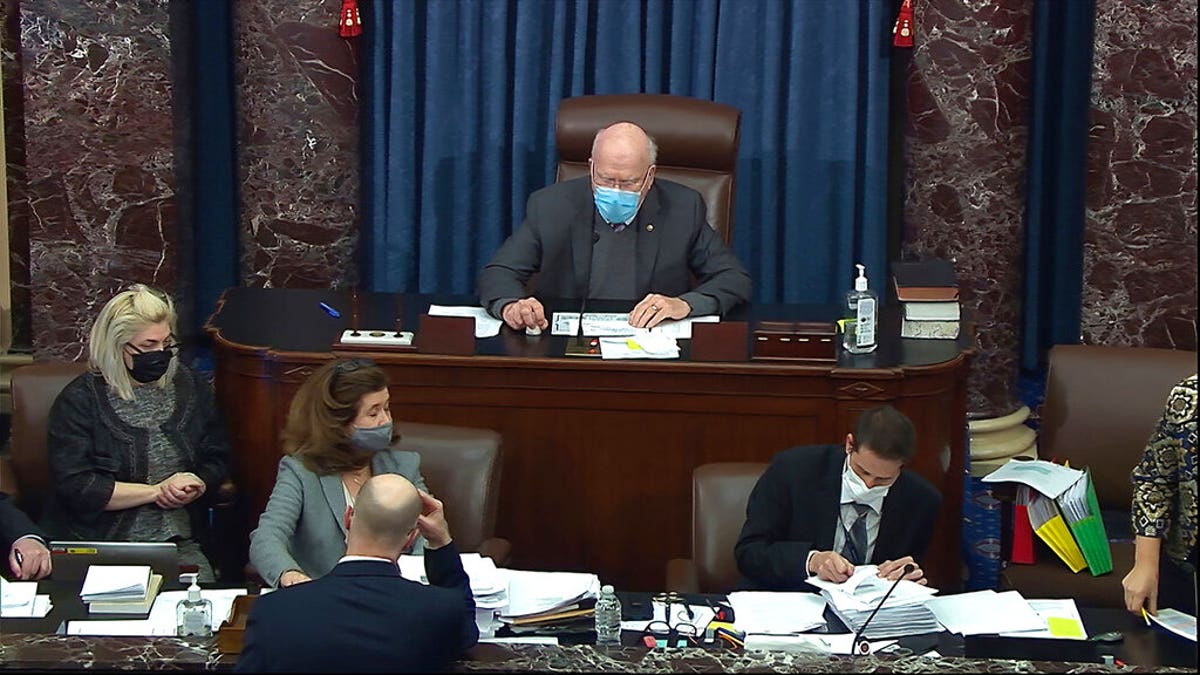Congress passes COVID relief bill as Biden's border crisis continues
FOX News White House correspondent Peter Doocy has the latest on 'Special Report'
Senate Democrats got a scare some weeks ago. Sen. Patrick Leahy, D-Vt., is the Senate’s president pro tempore, the most senior member of the majority party, and third in line to the presidency. Leahy joined the Senate in 1975 – when President Gerald Ford was in office.
Leahy presided over the swearing-in of senators as jurors in the second pending impeachment trial of former President Trump. Leahy’s voice sounded weak during the session. Word came a few hours later that the 80-year-old Leahy wasn’t feeling well. The Capitol attending physician recommended the Vermont Democrat head to the hospital for some tests.

Senate Majority Leader Chuck Schumer, D-N.Y., speaks at a news conference on passage of gun violence prevention legislation, at the Capitol in Washington, Thursday, March 11, 2021. (AP)
Leahy was back at home later that night resting. And, Leahy opened up the Senate the next day.
What would Democrats do if something happened to Leahy – or frankly, any other senator on their side?
"This is the type of thing which keeps me up at night," moaned one senior Democratic Senate aide. "I worry about lots of things."
Vermont has a GOP governor. Vermont Gov. Phil Scott would have the right to appoint someone should, God forbid, something happen to Leahy. But in a 50-50 Senate, everything operates on a day-to-day basis.
It’s a 50-50 Senate. Democrats are the majority party by virtue of Vice President Harris breaking ties. But, for a few days at the beginning of the Congress, Democrats found themselves in a practical minority. And Republicans were in a virtual majority.
Sen. Mark Warner, D-Va., was exposed to someone who tested positive for coronavirus. That meant he had to self-quarantine. And, with Warner out, Republicans technically had the majority. Unlike the House of Representatives, there’s no remote voting in the Senate.
With absences, Democrats found themselves stymied from even voting on a power-sharing agreement between the sides to begin the Congress. The Senate recognized Leahy as president pro tempore and Senate Majority Leader Chuck Schumer, D-N.Y. But operationally, GOPers still wielded committee gavels until the Senate finally worked out an organizational agreement.
This could be a tenuous two years for the Democratic majorities – if not less. As we always say in this space: It’s about the math. It’s about the math. It’s about the math.
"Narrow majorities are tough. But they're especially tough at a time of a pandemic," said Norm Ornstein of the American Enterprise Institute. "If you lose any of your members for any length of time, you are in deep jeopardy of losing the ability to muster a majority."
Lots of progressives and liberals are carping at Schumer to ditch the Senate filibuster. But wouldn’t the piece de resistance be if Democrats eliminated the filibuster – and then lost the majority?
Caveat emptor.
Democrats may have zero cushion in the Senate. However, Democrats do have a little bit of a buffer in the House. But it’s shrinking.
The current breakdown is 220 Democrats to 211 Republicans with four vacancies. As it stands now, if everyone votes, Democrats can only lose four votes on their side of the aisle and still pass a bill without GOP assistance. And Republicans are inching closer to narrowing the Democratic majority even more. The Senate just confirmed former Rep. Marcia Fudge, D-Ohio, as Housing and Urban Development secretary. This week the Senate will likely confirm Rep. Deb Haaland, D-N.M., as Interior secretary. The Democratic majority will shrink even more.
The late Rep.-elect Luke Letlow, R-La., died of COVID-19 even before taking office. That seat is a GOP seat, hands down. The late Rep. Ron Wright, R-Texas, died last month of COVID. Democrats may have an outside chance of winning that seat in a special election.
Remember, governors can’t appoint people to the House. New Mexico and Ohio will prospectively have to run special elections for the Haaland and Fudge seats. Both districts are solidly Democratic. But it may take a while for Democrats to get those seats back.
"A majority that gets us down to one, two, or three is not an experience we've had in the House," said Ornstein. "It's clearly a time of very significant peril. For just not the speakership of Nancy Pelosi, but for the policy agenda of Joe Biden."
Roll call votes may turn on a dime on a daily basis. This also brings into focus the possibility that the House could flip in the middle of the Congress – contingent on resignations or, God forbid, death. The Senate has switched party control during a Congress. But not the House.
Still, this poses extraordinary policy challenges for President Biden, Pelosi, and Schumer.

Sen. Patrick Leahy, D-Vt., the president pro tempore of the Senate, announces passage of Senate version of the COVID-19 relief bill by a vote of 50-49 in the Senate at the U.S. Capitol in Washington, Saturday, March 6, 2021. (Senate Television via AP)
Liberal Democrats are barking that their party seized control of the White House, House, and Senate. They expect big action on climate change, gun control, the minimum wage, and statehood for Washington, D.C., and Puerto Rico. But you can’t do that in such a divided House and Senate. In fact, the problem is not so much that Republicans will oppose these measures – but that moderate Democrats could stand in the way.
Progressive Democrats meddle with their moderates at their own peril. Kick those middle-of-the-road Democrats, who represent swing districts or states, to the curb and the Democratic majority evaporates.
BIDEN'S 'OPEN BORDER' POLICIES ENRICHING DRUG CARTELS AS MIGRANT CRISIS ESCALATES: GOV. ABBOTT
Liberals didn’t revolt on the COVID bill. But there was concern about liberal support slipping. That’s why Schumer made a point of immediately discussing climate change on the floor as soon as he worked out a power-sharing arrangement for the 50-50 Senate with Senate Minority Leader Mitch McConnell, R-Ky. Democrats must walk a thin line – repeatedly energizing the core of the party, while not alienating moderates.
What happens if liberals, or moderates, are unwilling to bend? To counter dissension, Democratic leaders may only have one option. Give a rousing, football coach halftime speech to rally the players.
"You're down to just one running back and one wide receiver. And you tell your team, ‘Are we going to do this or not? Are we going to come together or are we going to show the best that we have? We have enormous talent. Are we going to put that into play or are we going to fight among ourselves? The choice is ours to make and the stakes are high,’" says Danny Weiss, Pelosi’s former chief of staff.
CLICK HERE TO GET THE FOX NEWS APP
Pelosi is as good a vote counter as has ever walked in the door of the Capitol. But there are limits to her powers with such a narrow majority.
"The House is a beautiful instrument of politics," said Weiss. "You can win anything by one vote, except for a suspension bill. But in a place where you can win by one vote, I think they still have the sufficient margin to hold on to power."
And, in a Congress split like that, it may come down to a single vote – on a majority of occasions.















































